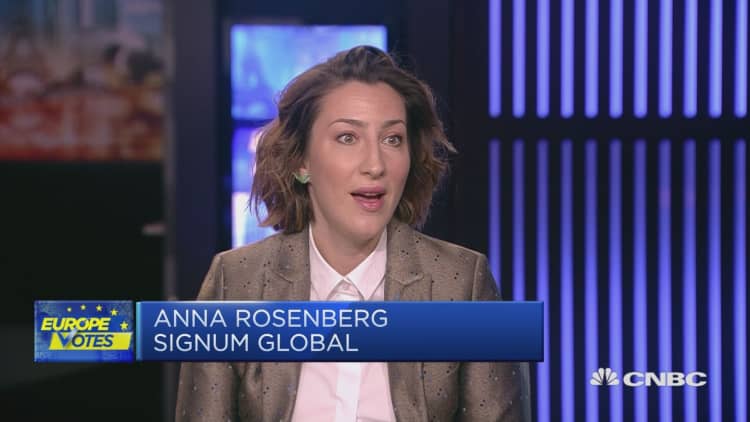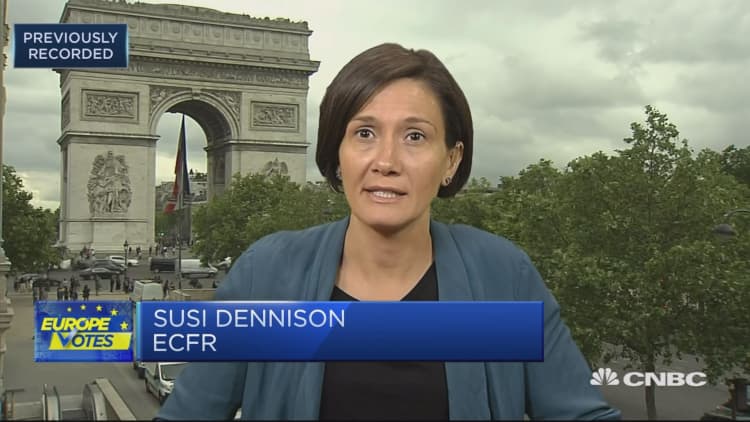EU votes still believe in the European project, experts claimed Monday, despite long-dominant centrist parties losing ground to euroskeptic and nationalist opponents in the parliamentary elections.
Voters delivered a fragmented result overnight on Sunday, meaning the make-up of the EU Parliament will appear more divided over the next five years. Some nationalist and anti-EU candidates enjoyed solid gains, while Liberal and Green parties also ate into the centrist block's stronghold.
Despite the strong showing for nationalist and far-right groups, experts told CNBC on Monday that the European Union still had significant levels of support.
"I think the voter turnout shows that people really still care about the EU and what the European Union is doing," Anna Rosenberg, head of Europe and the U.K. at advisory firm Signum Global, told CNBC's "Squawk Box Europe."
"It shows a trend that, rather than weakening, it's going to strengthen," Rosenberg added.

She said the new makeup of the European Parliament will help the EU become a global player in tackling issues like climate change, citing the rise in the Greens' share of the vote. Support for right-wing populist parties had been "overestimated," she added, and while some countries have seen a rise in nationalists, it's not a "European-wide trend."
Meanwhile, Vasileios Gkionakis, global head of FX strategy at Lombard Odier & Cie, noted that although the Greens and the Liberals veered from the center, both are parties in favour of the European project.
"The expectations were (for) a relatively meaningful increase in populist and nationalist parties which didn't actually take place," he said.
Italy remained an outlier where there was a marked increase in support for Matteo Salvini's nationalist Lega party. While there's "definitely an issue" as far as Italy's concerned, Gkionakis said, overall the result was "positive" for the EU.
Call for change
But that doesn't mean the EU can afford to be complacent, one analyst suggested.
"Some of these changes we're seeing at the margin tell us that Europe needs to change," said Guy Miller, chief market strategist at Zurich Insurance, noting the 2016 Brexit referendum where a majority of British voters rejected the EU.
However, he added there is now "an appreciation on the part of Europe" that the public was demanding to be listened to.
The expectation is that the EU will progress toward a vision held by French President Emmanuel Macron of a more united Europe, Miller said, "provided he can deliver a real feeling of vision."

Daniel Gros, director of the Centre for European Policy Studies agreed: "(Leaders) have to start realizing that maybe people have accepted Europe, but in some instances they want a different Europe – Brussels has to take that into account."
Gros noted that, as there was no clear winner, it could pose problems when it comes to selecting new leadership for the European Commission.
"I think (it will be) somebody from a party who has a strong showing in this parliament, maybe a Liberal, maybe Green," he said. "We need somebody who can put these parties together, because we have different coalitions on different issues, and we never know what the next crisis will bring, and therefore we really need somebody who can pull people together."
'Decisive moment'
Susi Dennison, senior fellow at the European Council on Foreign Relations (ECFR), told CNBC's "Street Signs Europe" that she was skeptical about hopes of a unified future and that Brussels had been left in a "very volatile post-election environment."
"There's this real disconnect between the political system and the voters and so I think there's a real challenge now for parties on both the pro-European and the anti-European side in terms of how they deliver that," she said.
"I don't think there's any guarantees that the (anti-European) parties, even though they've campaigned for the first time under a pan-European alliance, will actually be able to turn that into a way of working together in the parliament."
Earlier this month, the ECFR published research that found most Europeans believe the EU could fall apart within the next two decades — despite support for the EU reaching record highs.
"Europeans do feel that this is a decisive moment in the future of the European project, and… they're not sure which way it's going to go," Dennison added.
– CNBC's Sam Meredith contributed to this report.


